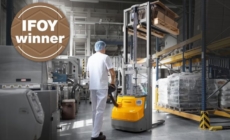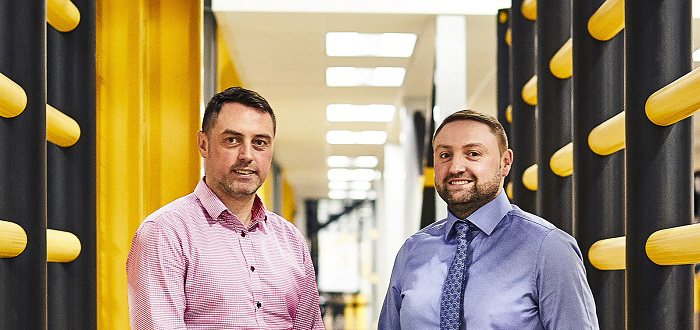-
ROSSLARE EUROPORT TARGETS HEALTH & SAFETY WITH CAMERA TELEMATICS PARTNERSHIP - July 25, 2024
-
Landmark Study Reveals Wearable Robotics Significantly Boost Safety and Efficiency in Industrial Environments - July 24, 2024
-
Visku Tackle The Retail Seasonality Challenge One Pallet At A Time - July 22, 2024
-
KAMMAC AND BERGEN LOGISTICS STRENGTHEN FASHION & LIFESTYLE SERVICES IN THE UK - July 19, 2024
-
TENTBOX EXTENDS PARTNERSHIP WITH ARROWXL TO SUPPORT INCREASING DEMAND - July 17, 2024
-
The Perfume Shop improves customer journeys while driving profitability in partnership with Scurri - July 17, 2024
-
ZEROMISSION SECURES £2.3M ($3M) INVESTMENT TO ACCELERATE ELECTRIC FLEETS - July 16, 2024
-
BCMPA CELEBRATES SUCCESS OF 2024 CONFERENCE - July 15, 2024
-
Best of the Best: Jungheinrich Celebrates Triple International Award Win - July 12, 2024
-
GOPLASTICPALLETS.COM CALLS ON NEW CHANCELLOR RACHEL REEVES TO CONSIDER PLASTIC PACKAGING TAX REFORM - July 10, 2024
Leading UK manufacturing innovator reacts to Autumn Budget.
Speculation raged during the weeks leading up to the Autumn budget release. Could Phillip Hammond deliver a radical statement? Or, with Brexit’s cloud of economic uncertainty rumbling on the horizon, perhaps major changes would be too risky. After backtracking on elements of his Spring budget, the Chancellor’s position is far from secure. Could this be his final chance to make a lasting impression on the nation?
Irrespective of what the red briefcase contains, here at A-SAFE we will adapt and continue our mission to be world-leading innovators in workplace safety. Since our founding day in 1984, we’ve seen all manner of political upheaval. Where politics changes, our drive to achieve is undeterred. Here we take a view on how the budget will affect the manufacturing and technology sectors we work in.
UK manufacturing has historically been one of the cornerstones of the economy, and some of the greatest technological innovations have come from these shores. If we are to compete on a global scale post-Brexit, now is the time to give us the economic tools.
The Patent Box tax incentive launched in 2013 is one such tool that has been useful for our business; ten of our innovations are currently patented or have patents pending. Encouraging businesses to innovate and try new things is a positive thing, however there appears to be no mention of any changes to the Patent Box incentive in the Autumn budget. The Research & Development (R&D) Tax incentives introduced in 2000 and 2002 created significant opportunities to drive UK innovation, it is great news that they will receive increased support. R&D expenditure credit will increase from 11% to 12% from January 2018. This is further enhanced by offering international talent support initiatives. Immigration rules will also be relaxed where R&D is concerned; allowing world-leading scientists and researchers to apply for settlement after three years, and highly-skilled international students to apply for work after graduating. Relaxed labour market tests and reduced red tape will make it easier to hire and sponsor talented international researchers. Exceptionally welcome after the potentially exclusionary picture that Brexit may have painted of our country.
If the UK is to emerge as a major player on the manufacturing world-stage, substantial drive behind skills development is vital. This will be addressed to some degree by the inclusion of “Lifelong Learning” initiatives, encouraging work-based training and re-training for priority sectors. However, with the UK workforce skills shortage likely to suffer by a significant reduction in migrant labour, this feels like patching over one problem with resource from another. Without easy access to skilled foreign nationals, domestic investment from manufacturers in workforce growth and development could be better incentivised, perhaps even rewarded.
We strive to recruit and nurture apprentices in every area of our business, but the existing apprenticeship scheme isn’t thriving as it could be, not only in manufacturing and technology, but across the board (official figures published in Oct show a 61% fall in new apprenticeships for May, June and July, compared to the same period last year ). We hoped this budget would include a significant increase in resource for apprenticeships and collaboration between education institutions and manufacturers, creating enthusiasm for manufacturing in future generations. This is an exciting time in our industry, with many interesting prospects for young people; we want to communicate that.
One of our aspirations for the coming year is to open an officially recognised Engineering Apprenticeship Centre. We aim to employ the best tutors and offer world-leading courses that will allow us to award engineering and manufacturing accreditation. However, it is not clear what this budget offers that could benefit our efforts to achieve this. All we are told regarding the Apprenticeships Levy is simply: “the government will continue to work with employers”. We would have liked more elaboration on this, with some concrete commitments.
Like manufacturing, technology too would benefit from support. This seemed to be forthcoming when the old ICT subject was replaced by computer sciences in 2015; a move which could have heralded the coming of a new generation of technological innovators. However, despite this shift in attitude towards the future of UK technology, the take-up could have been better.
“Britain is at the forefront of the technological revolution” Hammond claimed in his budget speech.
The stats say otherwise. Earlier this month, a Royal Society report into the reality of teaching computing revealed a worrying trend for UK technology innovation . In England, 54% of all secondary schools do not offer a computer sciences GCSE, with only 11% of pupils actually sitting an exam in the subject. This reduces opportunities for those technology companies or manufacturers, like ourselves, who do strive to recruit and nurture new industry talent. The future of our technology and manufacturing workforce will certainly need skills in coding and programming. Where workplace safety is concerned in the fourth industrial revolution, perhaps even hacking. As a safety product manufacturing and technology company, we have a vested interest in making sure our workforce can evolve to respond to the safety issues of the future. We hoped this budget would give us assurances that the Government is taking steps in a direction conducive to future innovation.
Thankfully Hammond did make efforts to deliver on this, committing £84 million to upskill 8,000 computer science teachers, ensuring every secondary school has a fully qualified computer science GCSE teacher. Along with the commitment to work with industry in setting up a National Centre for Computing that will produce training material and support schools, this gives us great hope for the future quality of the UK’s manufacturing and technology labour pool.
It will be interesting to see how well some of these commitments are delivered over the coming months and years. The support offered for manufacturing and technology is welcome, even if we would like to see more. It is a turbulent time in politics, but as ever, it is down to the UK’s manufacturing pioneers and technological innovators to knuckle down and face this uncertain future head-on.
































